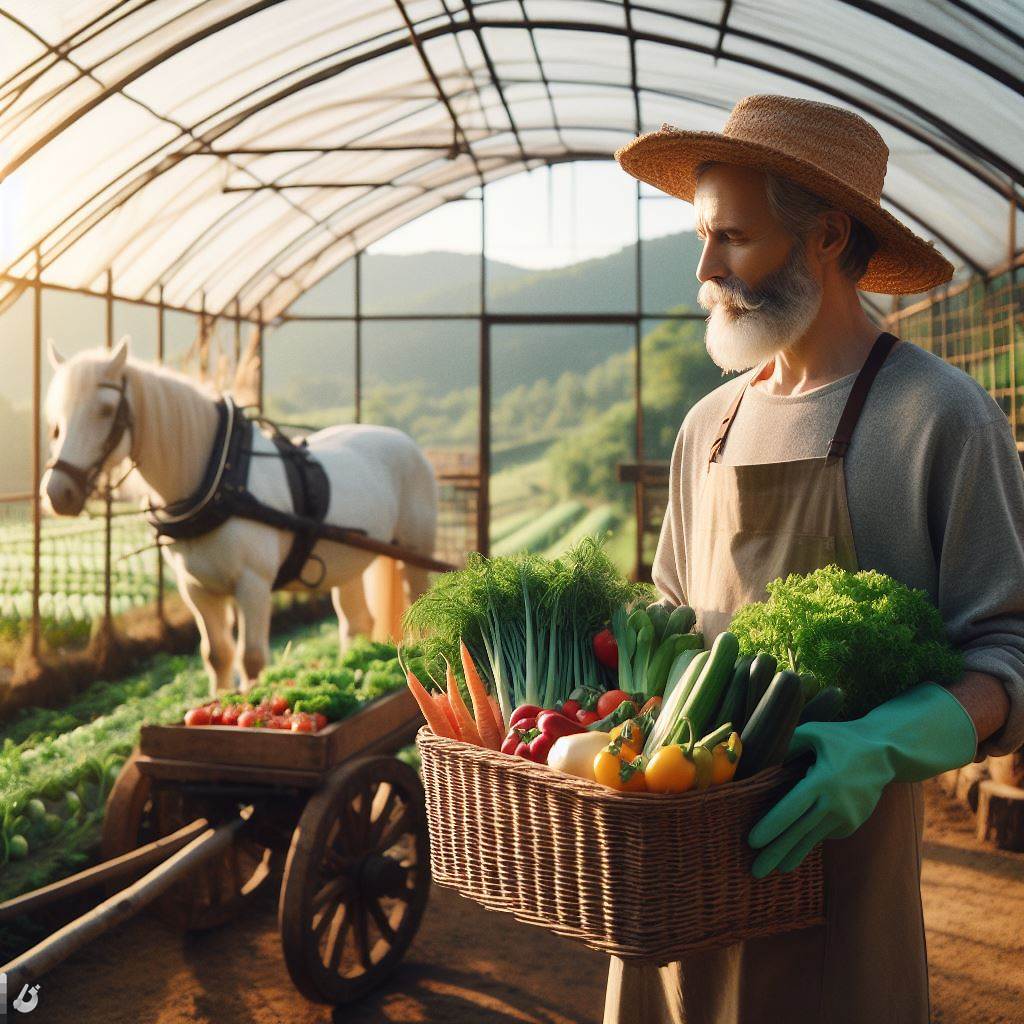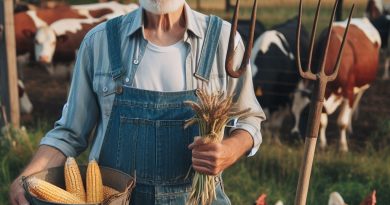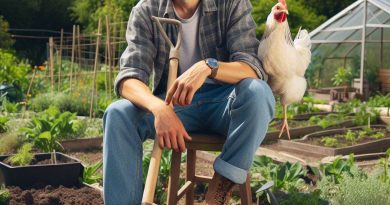Harvesting Hope: Stories from Organic Farmers
Last Updated on January 19, 2024
Introduction
Organic farming is a method of agriculture that relies on natural practices without the use of synthetic chemicals.
Organic farming plays a vital role in addressing environmental concerns and promoting sustainable food production.
This blog post discusses the book “Harvesting Hope: Stories from Organic Farmers” and its significance in highlighting the experiences of organic farmers.
“Harvesting Hope: Stories from Organic Farmers” invites you on an enchanting odyssey into the verdant landscapes of sustainable agriculture.
This anthology is a symphony of voices resonating from the fields, orchards, and homesteads of passionate stewards of the land.
Immerse yourself in the tales of perseverance, innovation, and symbiosis with nature as these farmers cultivate not just crops, but a profound connection with the earth.
Join us in this exploration of the roots, shoots, and fruits of a movement that is more than farming—it’s a celebration of life, resilience, and the boundless possibilities that bloom when hope is cultivated in the fields of sustainability.
“Harvesting Hope” is your ticket to the thriving world of organic farming, where every page is a testament to the unwavering commitment and the bountiful harvests of hope that flourish in the embrace of eco-conscious agriculture.
The Benefits of Organic Farming
Healthier food options for consumers
- Organic farming eliminates the use of synthetic pesticides and fertilizers that can be harmful to human health.
- Organic crops are grown with natural fertilizers and pest control methods, resulting in healthier and more nutrient-rich produce.
- Consumers can enjoy fresh and wholesome food without the worry of ingesting harmful chemicals.
- Organic farming practices prioritize the use of sustainable and natural methods that promote healthier food options.
- Studies have shown that organic produce contains higher levels of antioxidants and essential nutrients.
Environmental sustainability
- Organic farming practices promote the conservation of soil and water resources.
- These practices reduce pollution, soil erosion, and the contamination of water bodies.
- By avoiding the use of chemical pesticides and fertilizers, organic farming protects the ecosystem and biodiversity.
- Organic farmers work in harmony with nature, preserving ecosystems and mitigating climate change.
- Organic farming reduces greenhouse gas emissions and contributes to a more sustainable planet.
Enhanced soil fertility and biodiversity
- Organic farming practices focus on building soil health through natural methods such as composting and crop rotation.
- These practices improve the soil structure, increase water retention, and enhance the fertility of the land.
- Organic farmers prioritize the use of cover crops and beneficial insects, which promote biodiversity and natural pest control.
- By maintaining a balanced ecosystem, organic farming fosters the growth of a wide range of plant and animal species.
- The diverse microorganisms present in organic soils contribute to the overall health of the ecosystem.
Reduced use of chemical pesticides and fertilizers
- Organic farming eliminates or significantly reduces the reliance on synthetic pest control and fertilizer products.
- These chemicals can have negative effects on human health and the environment.
- By avoiding the use of chemical pesticides, organic farmers protect beneficial insects and pollinators.
- Organic farming methods focus on prevention, using natural techniques to ward off pests and diseases.
- Through crop rotation and diverse planting, organic farmers minimize the need for chemical inputs.
Overall, organic farming offers numerous benefits. It provides consumers with healthier and more nutritious food options, free from harmful chemical residues.
Additionally, organic farming practices protect the environment, preserving soil fertility, biodiversity, and natural resources.
By reducing the use of chemical pesticides and fertilizers, organic farming contributes to a more sustainable and eco-friendly agricultural system.
Read: Eco-Friendly Pest Management in Organic Farms
Organic Farming Methods
Crop rotation and cover crops
Organic farmers utilize crop rotation as a method to maintain soil health and fertility.
By rotating crops, they prevent the buildup of pests and diseases that are specific to certain plants.
Additionally, diverse crop rotations help to improve soil structure and nutrient availability.
Cover crops are also an essential part of organic farming. These are crops that are grown primarily to protect and enrich the soil rather than for harvest.
Cover crops help to control weeds, prevent soil erosion, and increase organic matter content.
They also fix nitrogen from the atmosphere, providing a natural source of fertility for the following crops.
Composting and nutrient management
Composting is a fundamental practice in organic farming. It involves the decomposition of organic materials, such as crop residues and animal manure, to create nutrient-rich compost.
This compost is then used to enrich the soil and provide essential nutrients to the plants.
Nutrient management is crucial in organic farming to ensure optimal plant growth without relying on synthetic fertilizers.
Organic farmers carefully manage the application of compost and other natural sources of nutrients, such as cover crops and crop rotations, to maintain a balanced and sustainable nutrient supply.
Natural pest control methods
Organic farmers prioritize natural pest control methods over chemical pesticides.
They implement a variety of techniques to manage pests, such as biological control, crop diversity, and habitat manipulation.
For example, they introduce beneficial insects that prey on pests or attract them with specific plant species.
Crop diversity plays a significant role in controlling pests. By planting a variety of crops, organic farmers minimize pest outbreaks, as each plant has unique pest vulnerabilities.
They also manipulate the farm’s habitat to create a favorable environment for beneficial organisms, further balancing pest populations.
Non-GMO and non-chemical seed selection
Organic farming strictly prohibits the use of genetically modified organisms (GMOs) and chemical seeds.
Instead, organic farmers opt for organic seeds obtained from non-GMO varieties.
These seeds are produced through traditional breeding methods without genetic modifications or chemical treatments.
By choosing non-GMO and non-chemical seeds, organic farmers prioritize the preservation of biodiversity and maintain the integrity of their crops.
This ensures that their produce remains true to organic principles and free from any potential health and environmental risks associated with GMOs and chemical seed treatments.
Focus on animal welfare in organic animal farming
In organic animal farming, the emphasis is on providing a high standard of animal welfare.
Organic farmers prioritize the animals’ well-being by providing access to the outdoors, natural feed, and spacious living conditions.
They avoid non-therapeutic use of antibiotics and hormones, minimizing the animals’ exposure to harmful substances.
Organic animal farming practices aim to create a natural and stress-free environment for the animals.
This not only promotes their health and happiness but also produces high-quality organic meat, eggs, and dairy products that meet consumers’ expectations for ethically produced food.
In fact, organic farming methods encompass a range of practices that prioritize sustainability, soil health, and animal welfare.
Through crop rotation, cover crops, composting, natural pest control, non-GMO seed selection, and animal welfare focus, organic farmers strive to produce food that is not only healthy and nutritious but also environmentally friendly and socially responsible.
Read: Organic Farming Myths vs. Facts: The Truth

Highlighting Organic Farmers
Story 1: The Journey of an Organic Farmer from Conventional Methods
In the world of farming, transitioning from conventional methods to organic farming can be quite challenging.
It requires a complete shift in mindset, practices, and strategies.
However, these challenges can lead to incredible success and achievements for those who embrace the organic way of farming.
One organic farmer, let’s call him John, set out on a journey to transition from conventional farming to organic methods.
He faced numerous hurdles during this process, including learning about organic certification, understanding the use of natural fertilizers and pest control methods, and finding the right balance for crop rotation.
Each challenge presented an opportunity for John to learn and grow as an organic farmer.
Despite the initial struggles, John’s perseverance paid off. He successfully transformed his farm into an organic haven, free from harmful chemicals and pesticides.
His dedication to sustainable practices brought forth not only healthier crops but also great financial success.
John’s organic produce quickly gained popularity in local markets and restaurants, attracting customers who valued the purity and nutritional value of his products.
John’s achievements as an organic farmer are truly remarkable.
From overcoming the challenges of transitioning to organic farming to reaping the rewards of higher demand and prices for his products, he serves as an inspiration to aspiring organic farmers.
Story 2: Multi-generational Organic Farming Family
In another part of the country, there exists a family with a rich history in organic farming.
Their dedication to organic practices spans several generations, with each member contributing valuable knowledge and wisdom to the family legacy.
The family’s journey in organic farming began decades ago when their ancestors recognized the importance of nurturing the land naturally.
They understood the long-term benefits of avoiding synthetic fertilizers and pesticides, and they passed down these lessons to subsequent generations.
From an early age, the children in this farming family learned the value of organic farming.
They witnessed their parents and grandparents work diligently to cultivate and maintain healthy soil, using cover crops and composting methods.
These lessons instilled in them a deep respect for nature and a commitment to sustainable farming practices.
Now, as adults, each family member plays a crucial role in sustaining the organic farming empire.
They continue to learn from one another, constantly refining and improving their methods.
Their dedication to preserving the integrity of the land and providing consumers with wholesome, organic products has earned them widespread recognition and respect in the farming community.
Story 3: Small-scale Organic Farming Success
Not all organic farming success stories come from large-scale operations.
In fact, small-scale farmers have been making a significant impact in their communities by adopting sustainable practices and engaging with consumers on a personal level.
One such farmer, let’s call her Sarah, operates a small organic farm on limited land.
Despite the challenges of space and resources, she has managed to create an oasis of organic goodness.
Sarah utilizes vertical gardening techniques, maximizes crop rotation, and employs natural pest control methods to make the most of her available land.
But Sarah’s success doesn’t end with her farming practices. She has managed to build a strong community around her farm.
Through farmers’ markets, CSAs (Community Supported Agriculture), and engaging with local schools, Sarah has fostered relationships with consumers who appreciate the dedication and hard work that goes into organic farming.
Sarah’s story serves as a reminder that success in organic farming is not limited to the size of the operation.
With passion, creativity, and a strong connection to the community, small-scale farmers can thrive and make a significant impact on the organic movement.
In essence, these stories from organic farmers highlight the incredible journeys, challenges, and achievements that come with adopting organic farming practices.
Whether it’s transitioning from conventional methods, sustaining a multi-generational legacy, or succeeding on a smaller scale, these farmers prove that organic farming is a viable and rewarding path.
Their stories inspire and encourage others to embrace organic practices and contribute to a more sustainable future for our food system.
Read: Sustainable Tools: Tech in Organic Agriculture
Overcoming Challenges in Organic Farming
In order to successfully navigate the challenges of organic farming, farmers must overcome various obstacles.
Certification Process and Compliance with Organic Standards
The certification process for organic farming can be time-consuming and costly, requiring farmers to meet strict guidelines.
Farmers must adhere to organic standards, avoiding the use of synthetic materials and genetically modified organisms.
Regular inspections are conducted to ensure compliance, adding to the workload and potential stress for farmers.
However, certification provides credibility and assurance to consumers who seek organic produce.
Economic Viability and Competition with Conventional Farming
Organic farming often faces challenges in terms of economic viability and competition with conventional farming practices.
Organic produce generally requires higher production costs, as farmers avoid synthetic pesticides and fertilizers.
Due to the higher costs, organic products can be priced higher, potentially limiting the reach of consumers.
Furthermore, conventional farming practices are often more established and supported by government subsidies.
Weather-Related Risks and Climate Change Impacts
Organic farmers are particularly vulnerable to weather-related risks and the impacts of climate change.
Extreme weather events, such as droughts or floods, can negatively affect crop yields and overall productivity.
Climate change brings unpredictable weather patterns, making it challenging for farmers to plan and adapt accordingly.
Implementing climate-resilient practices and using innovative technologies can help mitigate these risks.
Educating Consumers about the Benefits and Value of Organic Produce
A key challenge for organic farmers is educating consumers about the benefits and value of organic produce.
Many consumers are not fully aware of the advantages of organic farming, including environmental and health benefits.
Farmers need to invest in marketing efforts to raise awareness and communicate the value of organic produce.
Building relationships with local communities and participating in farmers’ markets can help in this educational process.
In general, organic farmers face a range of challenges that require perseverance and innovative solutions.
From navigating the certification process to educating consumers and combating climate change impacts, their dedication is commendable.
By moving forward, organic farming can continue to grow and play a vital role in sustainable agriculture.
Read: Biodiversity: Key to Sustainable Farm Success
Conclusion
Organic farming offers numerous benefits such as improved soil fertility, reduced pesticide exposure, and greater nutrition in food.
By purchasing organic produce from local farmers, we can support sustainable agriculture, protect our environment, and promote healthier eating habits.
The stories shared in this post provide a glimpse into the dedication, passion, and hard work of organic farmers.
Their experiences serve as an inspiration for us to make conscious choices and appreciate the value of organic farming.
Let us continue to choose organic products, connect with local farmers, and spread awareness about the importance of organic farming.
Together, we can harvest hope for a greener and healthier future!


